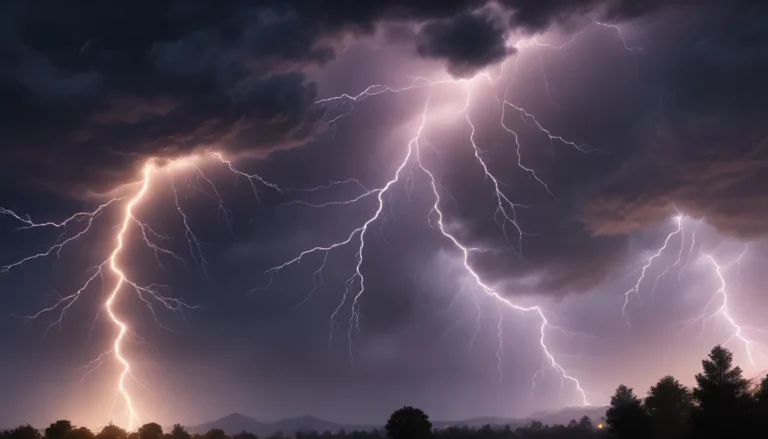A Note About Images: The images used in our articles are for illustration purposes only and may not exactly match the content. They are meant to engage readers, but the text should be relied upon for accurate information.
Light pollution, the often overlooked menace that dims the beauty of our night sky, has far-reaching effects on our environment, wildlife, and even our own health. In this illuminating piece, we will delve into 20 eye-opening facts about light pollution, shedding light on its detrimental effects and exploring ways we can combat this issue. From disrupting ecosystems to affecting human health, we will uncover the hidden truths behind the glow that shrouds our nocturnal world.
Unveiling Light Pollution: What You Need to Know
Light pollution occurs when artificial light saturates the natural darkness of the night sky, hindering our view of stars and planets. This phenomenon not only obscures celestial wonders but also disrupts ecosystems and poses health risks to humans. Cities worldwide contribute to this growing issue by emitting excessive light into the sky through various sources such as streetlights, billboards, and residential outdoor lighting.
How Light Pollution Impacts Wildlife
- Birds, especially migratory species, rely on starlight to navigate during their nocturnal journeys. Bright city lights can disorient these creatures, leading to fatal collisions with buildings or exhaustion.
- Sea turtles hatch on beaches but are often confused by artificial lights, causing them to stray away from the safety of the ocean.
- Insects, crucial for pollination processes and food chains, are drawn to artificial lights, disrupting ecosystems and endangering their populations.
The Effects of Light Pollution on Human Health
- Excessive exposure to artificial light at night can disrupt human circadian rhythms, resulting in sleep disorders and various health issues like obesity and depression.
- Glare from unshielded lights can cause discomfort and impair night vision, posing safety risks for drivers and pedestrians.
Wasting Energy and Resources: The Link Between Light Pollution and Energy Waste
- Inefficient outdoor lighting that shines light upward instead of where needed results in significant energy waste.
- In the United States alone, approximately 35% of light emitted by unshielded outdoor lighting amounts to roughly $3.3 billion in wasted energy costs annually.
Combating Light Pollution: Efforts and Solutions
- Cities and countries are adopting “dark sky” initiatives, implementing regulations to control light pollution through measures like using lower intensity bulbs and enforcing limits on unnecessary overnight illumination.
- Organizations like the International Dark-Sky Association (IDA) advocate for raising awareness and developing policies to safeguard night skies for future generations.
- Advances in lighting technology, such as LED lights with adjustable brightness and color temperature, offer promising solutions for reducing light pollution while meeting human needs.
Light Pollution’s Impact on Astronomy
- Light pollution poses significant challenges for astronomers, limiting the visibility of stars and galaxies even with powerful telescopes.
- Amateur stargazers and professionals often have to travel to remote, dark-sky locations to observe celestial wonders.
The Growing Trend of Global Light Pollution
- Light pollution is on the rise worldwide, increasing at a rate of about 2% per year and threatening the enjoyment of starry nights and ecological balance.
- Satellite images reveal that over 80% of the world’s population lives under skyglow, with nearly one-third unable to see the Milky Way from their homes.
Embracing the Cultural and Historical Significance of Starry Nights
- Throughout history, humans have drawn inspiration and guidance from the stars, forming cultural and navigational traditions.
- Indigenous communities, with rich celestial knowledge, suffer from the loss of dark skies due to light pollution.
Taking Action: Simple Steps to Combat Light Pollution
- Shielding outdoor lights and using warmer, lower-intensity bulbs can reduce light pollution and glare.
- Participating in dark sky initiatives and supporting policies aimed at curbing light pollution can contribute to preserving our night skies.
- Educating others about the importance of dark skies and promoting light-reducing practices can foster awareness and inspire collective action.
As we conclude our exploration into the world of light pollution, we are empowered with the knowledge to protect our precious night skies. By embracing sustainable lighting practices and advocating for policies that mitigate light pollution, we can ensure a brighter future for generations to come. Let us join hands in preserving the beauty of the night sky and creating healthier environments for all living beings.
Our Commitment to Quality Content
At [Your Company Name], we are dedicated to delivering trustworthy and engaging content that enlightens and educates our readers. Each fact shared is a result of contributions from individuals like you, ensuring a diverse range of insights and information. Our team of editors rigorously reviews each submission to maintain the highest standards of accuracy and reliability. Trust in our commitment to authenticity as we embark on a journey of exploration and learning together.
Get Involved: Frequently Asked Questions
- What is light pollution? Light pollution occurs when artificial light overwhelms the natural darkness of the night sky, impacting our ability to see stars and celestial bodies.
- How does light pollution affect animals? Excessive artificial light can disrupt animals’ natural behaviors and routines, leading to navigational challenges and endangering their well-being.
- Can light pollution impact human health? Yes, exposure to artificial light at night can disrupt circadian rhythms, resulting in sleep disturbances and various health issues.
- Are there areas free from light pollution? Dark Sky Parks are designated areas with minimal light pollution, offering unobstructed views of the night sky.
- What steps can be taken to reduce light pollution? Simple actions like shielding outdoor lights, using appropriate fixtures, and choosing energy-efficient bulbs can help combat light pollution.
- Is light pollution a growing problem? Yes, light pollution is increasing globally, but efforts are underway to raise awareness and implement solutions to mitigate its effects.
- How does light pollution impact astronomers? Astronomers face challenges in observing celestial bodies due to light pollution, necessitating remote locations for clear views of the cosmos.
Join us in the fight against light pollution by making conscious choices and spreading awareness. Together, we can preserve the beauty of the night sky and create a brighter future for all.






